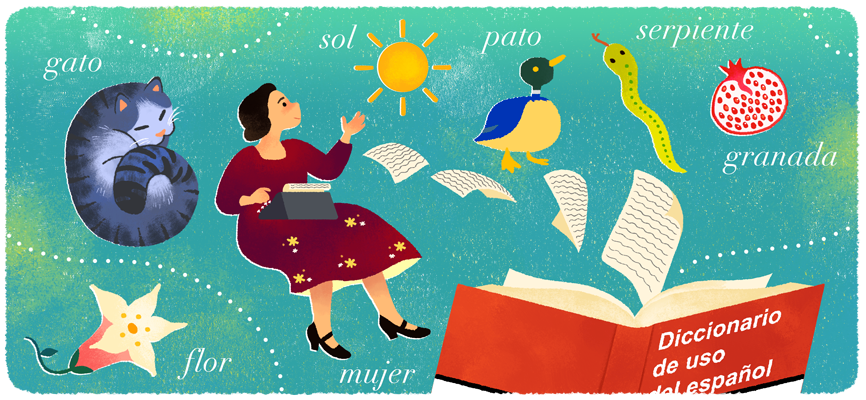Cada año, coincidiendo con esta efeméride, se celebra en Aragón el Día de la Educación aragonesa, aunque en esta ocasión, según la resolución de 4 de junio de 2018, aprobando el calendario escolar del curso 2018-2019, dicha celebración se traspasa al viernes, 24 de mayo, para poder celebrarla más intensamente, y tiene carácter de día lectivo a todos los efectos.
¿Por qué elegir a María Moliner? Pues porque fue sin duda una gran filóloga y una gran mujer. Calladamente, entre zurcido y zurcido de calcetines, como ella misma decía, María compiló uno de los mejores diccionarios de la lengua española, el Diccionario de uso del español. Una tarea que le llevó más de 15 años, anotando incansablemente en fichas manuales todos los sentidos de las palabras. María estuvo propuesta para académica de la RAE, pero entonces no estaba muy bien visto que hubiera mujeres entre tanto prócer. Así que no resultó elegida. Por otro lado, en su lugar de trabajo la llamaban "María la Roja", porque había ayudado en el plan bibliotecario de la Segunda República, el mejor plan de difusión cultural que ha tenido este país.
Incluso Google ha dedicado uno de sus doodle a la eminente filóloga aragonesa:
María Moliner devoted her whole life to working with words, and making their power accessible to all. Born in Paniza (a province of Zaragoza) on this day in 1900, the Spanish librarian, philologist, and lexicographer labored single-handedly to create a new kind of reference book, which was hailed as “the most complete, most useful, most accurate, and funniest dictionary of the Spanish language” by novelist Gabriel García Márquez.
Moliner began working as a librarian at age 22 and was elected head of the University of Valencia library in 1936. She took a special interest in the popular libraries project, developing a plan for Bibliotecas Rurales (Rural Libraries) to help promote literacy and culture. Following the Spanish Civil War, her family was penalized by the new authoritarian government, causing her to be passed over for faculty promotions.
Moliner began compiling her Diccionario de Uso del Español (Dictionary of Spanish Use) in 1952, working at home before and after her day job. A mother of four as well as a grandmother, she had extraordinary powers of concentration. Moliner would research words read in newspapers or heard on the street, aiming to outdo the dictionary published by the Real Academia Española. “The Academy dictionary is the dictionary of authority,” she once said. “Mine has not had much regard for authority.”
Instead of alphabetical organization, Moliner’s dictionary was grouped in families of words, offering not only detailed definitions, but also synonyms, and guidance on usage. When she began the project she estimated it would take two years, but the first edition of the two-volume dictionary was not published until 1966—a total of 15 years later!
Her life inspired a stage drama, The Dictionary, as well as a documentary film, Tending Words. However, the dictionary itself, sometimes referred to as “The María Moliner,” is widely considered her greatest legacy.
¡Feliz cumpleaños, María Moliner!



No hay comentarios:
Publicar un comentario
Envía tus comentarios